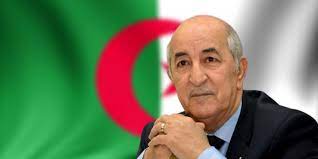Abdelmajid Tebboune is to run for a second presidential term, against the backdrop of relative stability after a
period of upheaval.
After weeks of speculation and uncertainty, Algeria’s outgoing president, Abdelmajid Tebboune, has officially declared his intention to run for a second term. The announcement, made in an interview broadcast on the state media, puts an end to a period of anticipation and rumours surrounding his political ambitions.
In the interview, Abdelmajid Tebboune explained his decision by referring to the requests he had received from various political and civil players.
“At the request of several political and non-political parties and organisations, as well as young people, I feel that the time has come to announce that I am seeking a second term in office, as permitted by the constitution, and the Algerian people will have the final say,” he said.
This passage underlines the president’s desire to rely on a democratic legitimacy strengthened by popular
support.
President Tebboune was keen to stress that the achievements of his current term of office are the fruit of the collective efforts of the Algerian people. “All the achievements are those of the Algerian people, not mine,” he said.
This statement highlights a shared vision of governance, where national progress is presented as a collective
achievement rather than the result of the actions of an individual.
He also spoke of the significant economic improvements achieved during his term of office.
“It is common knowledge that state revenues have increased, that the haemorrhaging of the treasury is a thing of the past, and that Algeria has spent well the funds it has been able to recover, estimated at billions of dollars,” he said.
This positive economic record serves to strengthen his candidacy, by demonstrating his ability to manage and redress public finances effectively.
The president also emphasised the progress made in the area of civil rights. “Algerian citizens today enjoy all their rights and fulfil their duties,” he said.
This statement was intended to reassure the electorate that individual freedoms and civic duties would be
respected as crucial elements in an evolving democracy.
The announcement of Tebboune’s candidacy comes at a time of relative stability in Algeria, following a period of political and economic turbulence. His term in office has been marked by significant economic and social reforms, as well as a determined fight against corruption.
The outgoing president is thus positioning himself as the guarantor of continuity and progress.
Reactions to this announcement have been mixed. Tebboune’s supporters see him as a leader capable of pursuing the reforms needed to modernise the country, while his detractors criticise what they perceive as a lack of concrete results in certain key areas, such as unemployment and social inequality. However, the announcement of his candidacy could bring together a significant proportion of the electorate, who want stability and continuity in governance.
Tebboune’s political career, marked by ministerial posts and his commitment to state reform, presents him as an experienced and determined candidate. His ability to navigate Algeria’s complex political landscape, while implementing policies of economic modernisation, will be a major asset in his campaign for a second term.
The forthcoming presidential election will therefore be a crucial moment for Algeria, offering citizens an opportunity to choose the country’s future direction. Tebboune’s candidacy, with its emphasis on continuity and the consolidation of gains, promises a lively election campaign that will be decisive for the nation’s political and economic future.
In the meantime, political observers and the general public will be keeping a close eye on developments in this campaign, which promises to be a decisive turning point for Algeria.
The outcome of the election will determine not only the country’s political trajectory, but also its role on the international stage. By announcing his candidacy, Abdelmajid Tebboune is opening a new chapter in Algerian
political history, with the hope of continuing and expanding the reforms begun during his first term.
MN/Sf/fss/as/APA


